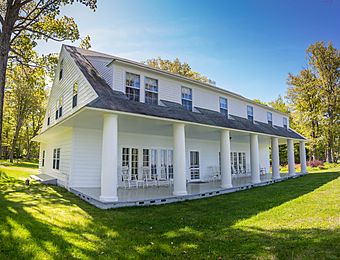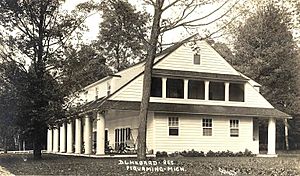Hebard–Ford Summer House facts for kids
|
Hebard–Ford Summer House
|
|

Hebard–Ford Summer House, 2019
|
|
| Nearest city | L'Anse, Michigan |
|---|---|
| Area | 4.5 acres (1.8 ha) |
| Built | 1914 |
| Architectural style | Bungalow/craftsman |
| NRHP reference No. | 82002824 |
Quick facts for kids Significant dates |
|
| Added to NRHP | May 5, 1982 |
The Hebard–Ford Summer House is a special old house in Pequaming, Michigan, near L'Anse, Michigan. People also call it the Ford Bungalow. It's important because it was named a Michigan State Historic Site in 1979. Later, in 1982, it was added to the National Register of Historic Places. This means it's a very important building in American history.
Contents
History of the Hebard–Ford House
The story of the Hebard–Ford Summer House begins with a man named Charles Hebard. He was a very successful businessman in the lumber industry. In 1878, he started a logging town called Pequaming. This town was about nine miles north of L'Anse, right on the shore of Lake Superior.
Pequaming was the first really big lumber operation in the Upper Peninsula of Michigan. Charles Hebard owned all the buildings in the town. This included about 100 houses for his workers. The town grew, and by 1897, about 800 people lived there.
From Hebard to Ford
Charles Hebard passed away in 1904. His sons, Daniel and Charles, took over the lumber business and the town of Pequaming.
In 1914, Daniel Hebard built this lodge as a place to stay sometimes. Then, in 1923, the Hebard brothers sold their whole operation to Henry Ford. Henry Ford was famous for making cars. He mainly wanted the 40,000 acres of timber (trees) that the Hebards owned. However, the brothers insisted that Ford buy the sawmill and the entire town at the same time.
Henry Ford then started using the town to make wooden parts for his Ford station wagons. He also took over Daniel Hebard's lodge for his own use. Henry Ford spent his summers at this house from 1923 until 1941.
The End of the Mill
During the Great Depression, which was a tough economic time, Ford didn't need as much lumber. Also, shipping wood became difficult during World War II. Because of these problems, Ford closed the mill in Pequaming in 1942. When the jobs were gone, most families moved away from the town.
Today, the Hebard–Ford house is still privately owned. However, you can rent it for vacations.
What the Hebard–Ford House Looks Like
The Hebard–Ford house is a rectangular building with two stories. It's built in a style called "Bungaloid." This means it has some features of a bungalow, like a low roof.
The house is made of wood and covered with white clapboards. It has a low, sloped roof with long windows sticking out from it. There's a porch, called a veranda, that is covered by the roof. Seven strong cement pillars hold up this roof.
Inside and Outside Features
On the main floor, you'll see windows with six small panes of glass on the top and six on the bottom. These windows have dark frames. There are also two sets of French doors that open onto the veranda.
Inside the house, there are eight bedrooms and seven bathrooms. It also has a large living room, a dining room, and an office. Outside the main house, there used to be a home for a caretaker. There was also a beautiful formal garden and a tennis court.
This house shows the fancy way of living that wealthy business owners enjoyed at their vacation homes in northern Michigan.
 | Emma Amos |
 | Edward Mitchell Bannister |
 | Larry D. Alexander |
 | Ernie Barnes |




